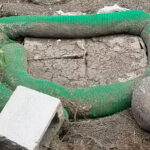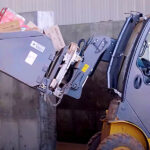Washington State lawyer who works with both composting facilities and impacted neighborhoods explains the legal intricacies when it comes to off-site odors.
Katrina Mendrey
BioCycle February 2014
>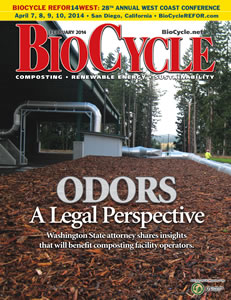 In November 2013, the Washington Organic Recycling Council held its annual conference in Vancouver, Washington. The conference theme was “Compost Odors: Causes And Effects.” Presentations covered human responses to odors, characteristics of odor compounds and community outreach. A presentation titled, “Odor Lawsuits: How To Avoid Them And What To Do When They Arise,” was given by Bradley Jones, an attorney with Gordon, Thomas, Honeywell LLP, located in Washington State with offices in Seattle and Tacoma. Jones has worked with community groups taking legal action against odor sources, as well as advise composting facilities on how to avoid lawsuits.
In November 2013, the Washington Organic Recycling Council held its annual conference in Vancouver, Washington. The conference theme was “Compost Odors: Causes And Effects.” Presentations covered human responses to odors, characteristics of odor compounds and community outreach. A presentation titled, “Odor Lawsuits: How To Avoid Them And What To Do When They Arise,” was given by Bradley Jones, an attorney with Gordon, Thomas, Honeywell LLP, located in Washington State with offices in Seattle and Tacoma. Jones has worked with community groups taking legal action against odor sources, as well as advise composting facilities on how to avoid lawsuits.
BioCycle interviewed Brad Jones to learn more about his experience in the legal arena regarding odor nuisances, and seek his recommendations on steps that composters can take to avoid legal actions. Jones notes that while he has not defended a composting operation in a lawsuit, he has advised composters on how to avoid lawsuits and how to address odors, neighbors and regulators. He also has negotiated regulatory agreements for composters with various agencies.
Legal Landscape
BioCycle: Please describe your experience representing communities or individuals with complaints against composters or other nuisance odor sources.
Jones: Starting in the mid 1990s, my firm and I started representing Washington residents around composting, landfill and sewage treatment facilities that had been operated improperly and were causing obnoxious odors and other adverse effects to area residents. Our first lawsuit involved the Olympic View Sanitary Landfill in Kitsap County, Washington. The next lawsuit was against the privately owned Cedar Grove Composting site in Maple Valley and the County-owned Cedar Hills landfill and neighboring solid waste facilities in King County. We represented about 1,500 people in the first lawsuit and about 10,000 people in the Cedar Grove/Cedar Hills lawsuit. Another lawsuit involved the Hawks Prairie landfill in Thurston County, Washington, where we represented about 3,000 neighbors. Then there was a suit in Yakima involving the Yakima Valley Wastewater Treatment Plant and Del Monte Foods, which had a field adjacent to the treatment plant where they sprayed their wastewater from fruit processing. So the vast majority of my experience comes from suing odor sources on behalf of classes of area residents or property owners.
BioCycle: Were these lawsuits specifically due to odor complaints or were other factors involved?
Jones: While all of these lawsuits have dealt with odor issues, some also involve other factors. For example, some of the landfill lawsuits dealt with the congregation of birds, such as flocks of 15,000 seagulls or more. In one case, noise from landfill operations and vibrations from a poorly constructed landfill gas control system that caused minor tremors at immediately adjacent properties were additional issues we addressed. But the principal issue in all of those cases was odors.
BioCycle: What is the primary basis of these odor-based damage claims?
Jones: There are typically two components to an odor-based damage claim. The first involves property damages or the devaluation of property. The second involves personal damages for the annoyance, inconvenience, harassment or embarrassment of having to live with the odors and how that affects one’s indoor and outdoor activities and quality of life.
BioCycle: What were the outcomes?
Jones: None of the suits actually went to trial. All of them settled, some within weeks of trial. In total, the recoveries for the neighbors were approximately $50 million.
BioCycle: Do the defendants typically have insurance to cover these settlements or lawsuits?
Jones: Not generally. After the passage of CERCLA (Comprehensive Environmental Response, Compensation, and Liability Act, commonly known as Superfund) in 1980 and similar state environmental laws, the insurance companies began writing “pollution exclusion” clauses in nearly every commercial general liability policy. These days, in order to obtain coverage for damage claims caused by odors, that coverage must be explicitly bargained for, usually at a pretty steep price.
BioCycle: In cases where there are multiple potential odor sources, how is it determined which party is causing what problem?
Jones: This comes up in nearly every case. The principal odor source that is causing the problem will invariably allege that the odors are coming from somewhere else. The way I have tried to differentiate between odor sources is through a combination of personal testimony from people who are experienced enough to be able to differentiate between the odor sources, and utilizing experts and their analysis of meteorological data. Experts using meteorological data, like wind speed, wind direction and barometric pressure, can help validate odor complaints and determine whether a given odor complaint is attributable to a particular source.
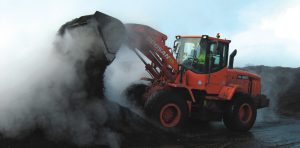
Keeping track of meteorological data is very valuable, particularly if the composter has the ability to adjust potential odor-generating activities, such as turning of active composting piles, to times that are the least likely to result in off-site impacts.
BioCycle: Are there any notable precedential cases that can be applied to odor related lawsuits?
Jones: There are a series of cases from the 1950s to the 1980s that established much of the Washington State law regarding nuisance or trespass claims. Many of the earlier cases involved obvious airborne fallout from industrial sources, like cement plants. The next phase of cases involved increased noise from airports brought about by the onset of jet airplanes. One notable case is Bradley vs ASARCO in which the Washington Supreme Court said that even invisible particulates, like microscopic amounts of lead and arsenic that accumulate over time and cause interference with use and enjoyment of property, can be a nuisance.
The related concepts of nuisance and trespass come out of the English common law so they are applied fairly uniformly across the U.S. The Bradley vs ASARCO case has been cited by a number of state courts. It is considered a fairly prominent case on a national level regarding odor and airborne nuisance claims.
BioCycle: Articles in BioCycle have discussed the science of odor and the emotional responses odors can bring. One aspect of this is that even when odors aren’t present, the sense that they are present can still occur. How do you determine which odor complaints are legitimate?
Jones: That is a difficult question. The reality is that some people, once exposed to a very strong and impactful odor, can develop more sensitivity to the same odor. And for many of the people I have represented, the damage is not just when the odors are present, but wondering when they will come next. But to determine the legitimacy of odor complaints, I generally start with whatever written records there are of complaints. Those records may be from the local air pollution control authority, the local health department, the operators themselves, or even contemporaneous notes on a neighbors’ calendar or journal. Those complaints are collected, and the more specific data you have concerning those complaints, the better they are. For example, having the time, date and location of the complaint is the most valuable information because that can be matched against contemporaneous meteorological records to determine if the weather conditions were conducive to transmitting an odor from the source to that particular individual. In one case, we were able to validate over 90 percent of the complaints using this method.
BioCycle: Can you explain the legal premise for a composter being sued for issues surrounding odors even if they were operating well before growth led to neighbors living in close proximity?
Jones: There is a centuries old legal doctrine called “Coming to the Nuisance,” which generally provides that if a nuisance source (i.e. odor, noise, dust, etc.) has been in an area for a significant period of time before development and then, through growth all of a sudden there are housing developments around that odor source, the nuisance was there first and then others elected to “come to the nuisance.” The concept was akin to “buyer beware” and was based on the premise that you should have known of the source, the likely impacts from the source are already imbedded in the price you paid for the property, and therefore you don’t have a claim. That concept has fallen into disfavor in the courts with the expansion of the property rights movement and really has no viability anymore in the case of odor sources.
Class Action Lawsuits
BioCycle: What are typical claims brought by plaintiffs against a composter related to odors?
Jones: For a plaintiff suing a composter, the general claims brought are as follows: Nuisance, the unreasonable interference with use and enjoyment of property; Trespass, the unpermitted putting of something onto the property of another; and Negligence, a breach of a standard of care. The standard of care for a negligence claim will be judged by what regulators or the composting industry have established as best management practices (BMPs), and what the regulations provide. Failure to adhere to either the BMPs or regulations will likely result in a finding of liability.
BioCycle: Is one party more challenging than the other to represent?
Jones: It depends on the facts and the strength of the facts. There have been some cases where it has been relatively easy to represent the impacted residents. For example, in one case, about 4,000 odor complaints were filed against a source within a year and there was a very strong record of regulatory observations to support the claims. In other cases where there is a lack of regulatory records, complaint records or significant evidence of impact, it is much more difficult to represent the plaintiffs. The converse would be true in representing the composter. If they have good facts or a strong record of efforts to address complaints, then they will be easier to defend than if they have no facts and have made no attempts to address issues. The worst type of composting facility to work with is one that resolutely denies it creates odors and sees some type of conspiracy behind every regulator or complainant.
BioCycle: What type of evidence can be used by the plaintiff to prosecute a defendant in odor-related lawsuits?
Jones: Often times you’ll have the complaint records and the meteorological data we just discussed. Then you will look for regulatory records, notices of violations, penalties or fines. The plaintiffs are trying to prove two things. First is that this defendant’s operation is causing odors because it is poorly designed, constructed, maintained or operated. Next is to prove that odors generated by one or more of those deficiencies are getting out to the plaintiffs in sufficient frequency, and at sufficient strength and duration, that they are causing damages. From there, a lot of the work will be done by experts, such as having a nationally recognized composting expert conduct an assessment of the facility’s operations and report they are deficient in certain respects, thus bolstering the claim that the defendant in causing odors.
Plaintiffs may also engage an odor modeling expert or meteorologist who will establish the frequency, intensity and duration of odors in various neighborhoods or subneighborhoods, as well as experts who will assess property damages. This involves high-cost appraisers who do mass appraisals to determine to what extent, if any, the values of properties in those neighborhoods have been reduced or suppressed because of odors caused by a composting operation. This usually involves comparing certain metrics from the impacted neighborhood (for example sales price per square foot, differences between asking and sales price, average days on market, etc.) to the same metrics from another neighborhood that is nearby, with similar housing stock, but is not affected by odors.
BioCycle: At what point in the process are you typically contacted?
Jones: I am the last resort. What’s important for a composter or odor source to understand is that my involvement usually comes at the end of the process. I am usually the last call that a person makes. Usually what happens is that if a person or neighborhood is experiencing problems they will first deal with the source directly or the local regulator. Over time, if there is a response to those complaints or a perceived response, that will generally be the end of it.
I am contacted when people have gone through the process and feel they are being ignored or they aren’t believed or respected. The best way to prevent lawsuits is to prevent people from getting so frustrated that they feel they have no other alternative but to sue.
BioCycle: Does a complaint typically precede a lawsuit or have you experienced cases where lawsuits are filed first?
Jones: I am not aware of any cases where the lawsuit is filed first. It is typically the act of last resort. In fact, I would be leery of a lawsuit that was not preceded by a significant number of complaints.
BioCycle: Who typically makes the rulings in these sorts of cases, i.e., mediator/settlement, jury, judge?
Jones: Almost all of these odor cases are in state courts as opposed to federal courts. As a plaintiff you generally want to take these cases to a jury, who you hope will become incensed over the conduct or lack of action on the part of the defendant. But before you get to the jury you will usually have one to three years worth of discovery and motion practice, all of which is directed at a judge. At some point, when both parties agree, they can begin settlement discussions. When this occurs depends on the willingness of the parties. It can occur early, mid-phase, or on the courthouse steps right before trial.
One of the reasons I advise clients that settlements are always preferable to going to trial is that in a settlement context, you are actually negotiating a contract. There is much more freedom and flexibility to address issues in a settlement context that a court doesn’t have the legal authority to address. When you are going to the court you are asking if the defendant is liable and if so, what are the monetary damages. In a settlement context you can talk more about operational characteristics, advance notices of various activities, monitoring — whatever the parties decide they want to include in a settlement agreement they are free to do.
BioCycle: Are remediation steps, e.g., changing composting methods, timing of operations, feedstocks accepted, etc., part of settlement agreements?
Jones: Absolutely. Nearly every plaintiff in these class action cases simply wants to regain full use and enjoyment of their property and not be burdened by odors. Settling an odor case for just dollars does not alleviate the problem. Nearly every settlement I have negotiated, except for facilities that decide they can’t or don’t want to come into compliance and elect to close, has some operational and monitoring component.
Key Steps For Composters
BioCycle: What are preventative steps composting facilities can take to protect themselves from lawsuits due to odor issues?
Jones: First and foremost, treat every neighbor with respect and treat them seriously. I have advised composters to be aggressive in their outreach and involvement in the community. Donate compost to local playgrounds and parks. Be a good neighbor. Have open houses, explain what you do, how you try to control odors. Educate your neighbors. Perhaps have a “free compost day” for your closest neighbors where they can each take a cubic yard or more of compost. Use newsletters.
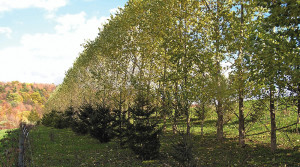
Settlement of a lawsuit often includes steps that the composting facility must take to address odor issues, such as planting of vegetative buffers that aid in odor dispersion. Photo by Robert Rynk
Also, have an odor hotline, where neighbors can call the facility instead of a regulator. But composters should only have a hotline if they intend to seriously use it and respond to those complaints. If all they are trying to do is divert the complaints from the regulator and then essentially ignore them, they are going to get sued. However, if composting facility managers use the complaint information to go out and assess their operations to address any issues, if they do in fact exist, they will likely avoid litigation.
Treat regulators as well as you treat your customers. Try to develop positive working relationships with the regulators. Invite them to the composting site when major improvements have been made or a milestone has been achieved. Relationships with regulators are also a critical factor when it comes to lawsuits. Bad testimony from a regulator at trial is some of the best evidence that a plaintiff can ask for, because a jury is going to put extra weight on the testimony of a regulator who they see as an expert in the field looking out for the interest of the public. They will also be viewed as unbiased. So if a facility has bad relations with regulators, and they give critical testimony at a deposition or trial concerning the composting operation, that will be very damaging.
BioCycle: You have discussed use of meteorological data in assessing odor impacts. How beneficial is it for the composter to track meteorological data and how much weight does that data carry in a trial or negotiated settlement?
Jones: Installation of a meteorological station allowing composters to collect data over time can be very helpful to a facility, but if the facility isn’t operating properly and is causing lots of odors, that information may be used against them.
But having that meteorological information can be very valuable, particularly if the composter has the ability to adjust certain activities — especially odor causing activities — to times that are the least likely to result in the release of odors or a time when odors will not be noticed. For example, the highest incidence of odors occurs in inversions and during times with relatively still air. In contrast, if winds are over 10 mph or higher, there is so much mixing in the atmosphere that odors are diluted fairly rapidly. Furthermore, most odor complaints come between 5:00 am and 8:00 am and 4:00 pm and 9:00 pm and on weekends, when people are home, awake and active. To the extent that composters can schedule odor-causing events outside of those windows, they are probably going to have fewer complaints.
Legal Options For Composters
BioCycle: What should composters do if a problem they are having escalates to a lawsuit?
Jones: The first thing is hire a lawyer and notify your insurance carrier. Unless composters have special coverage, it is likely that their policy(ies) will not cover an odor lawsuit. But it is always worth checking. Another step would be to closely examine operations, looking for improvements. They should work with the regulators to ensure they are compliant with their permit and applicable laws. This can also generate positive evidence.
I also encourage early settlement discussions. It’s always easier and less costly to settle a class action complaint early, before the court certifies that the case can proceed as a class action. And it’s important to understand what the plaintiffs are looking for. Is it just money they want or do they want changes to operations?
BioCycle: What should composters not do if the problem escalates to a lawsuit?
Jones: I would start with the fact that 95 percent or more of these suits settle. So eventually they are going to be looking for settlement opportunities. Given that composting facilities at this point are dealing with people that feel so aggrieved, ignored and put upon that they have had to resort to litigation, continuing to prod and poke them with personal attacks, indignance or absolute denials of having done anything wrong may not induce a willingness to settle.
My advice, which is different than what you’d get from most attorneys, is it’s never too early to talk settlement. So after they have been sued and after they’ve retained counsel, I would suggest at least contacting the plaintiff’s counsel to try to determine what the suit is really about and what their clients are looking for in ultimate relief.
The knee jerk reaction of an odor source is often to immediately deny or point fingers at others. That is the kind of conduct that while it may be appropriate and even necessary in a legal setting, is not going to do anything to advance a composter’s cause with regulators or the plaintiffs.
BioCycle: What type of evidence can be used by the defendant (composter) to argue their case in front of the court?
Jones: Some of the best evidence could be the regulators; if they have positive things to say about a composter’s operations and responses to their recommendations, that can be very powerful testimony. Also, any awards or recognitions a composter has received, particularly those that relate to environmental or water quality or operational characteristics, would be very valuable.
Meteorological evidence can be used by both sides. A defendant may be able to attack the credibility of some complaints based on conflicting meteorological data.
Some odor sources have either trained or hired their own odor inspectors. They will set out a program that specifies a schedule and location(s) where inspectors will routinely go out and see if they can detect any off site odors. They then prepare a log of those over time. I have seen some odor sources try to use these records that show a lack of odors within a community as evidence. However, the results of odor surveys prepared on behalf of an odor source are often suspect and subject to claims of bias whereas odor records of regulators are generally perceived as more trustworthy.
BioCycle: Are there any states that are particularly difficult to represent defendants in? What makes these difficult?
Jones: I can only speculate. States like Oregon, Washington and California, which are considered “green states,” might be more supportive of composting, deeming it a strongly favored public policy. Therefore, an argument by a defendant that they are diligently providing a public good might affect a jury’s assessment of the case. But these same states might also place a high value on people’s ability to enjoy their outdoor spaces, particularly their own property. In contrast, more conservative states that have a stronger philosophy toward property rights may feel that a composter’s impact on someone’s ability to use their property is more worthy of a finding of damages.
BioCycle: Are there any states with laws that protect or make defending composters easier?
Jones: There are some states with “right to farm laws” that have been interpreted to provide some protections to composters. In one of my Washington State cases, a composter tried to make that argument under a similar Washington statute and it was unsuccessful. A composter may have more success with this argument in strong farming states like Iowa, Nebraska or Kansas, or in agricultural communities.
BioCycle: Are there resources or models composters should be aware of?
Jones: As a lawyer, I look for ways to argue about liability and damages and if there is a publication from a regulatory agency that’s making recommendations, even though it doesn’t have the legal force of statutes or regulations, a jury will perceive that to be the standard of conduct that all composters should apply. If a composting facility is falling short of those standards, that provides a strong argument to a jury for why the composter should be liable for any odors that arise out of that failure to follow those recommendations.
Finally, in my experience the regulators are honestly interested in seeing composting succeed. Many will go out of their way to work with a composter who is struggling to control odors. I think too many composters view regulators as the enemy when, in reality, there is no better friend you can have than a regulator who thinks you are making your best effort.
While the odor wheel can be a helpful tool users should be careful not to discount odor complaints that do not describe onsite smells. “If you smell the piles at a facility and these don’t match a smell complaint there is always a chance the smell will be different downwind,” warns McGinley. That said, he believes there is no excuse for not using an odor wheel to manage odor at a composting facility. “It’s a simple tool that will go a long way toward managing odors.”
Katrina Mendrey is a Contributing Editor to BioCycle. She recently completed a Master’s degree in Soil Science from the University of Washington.



